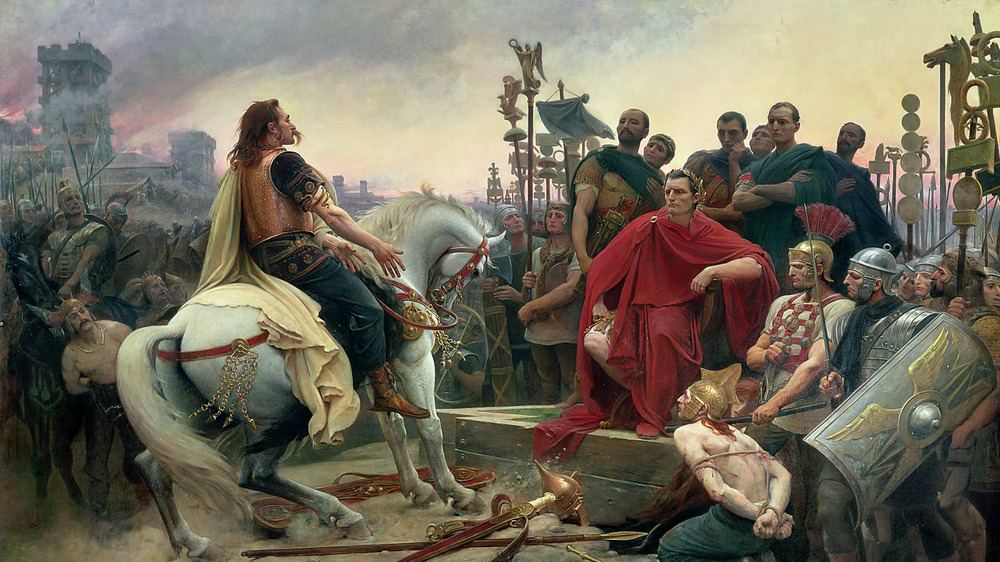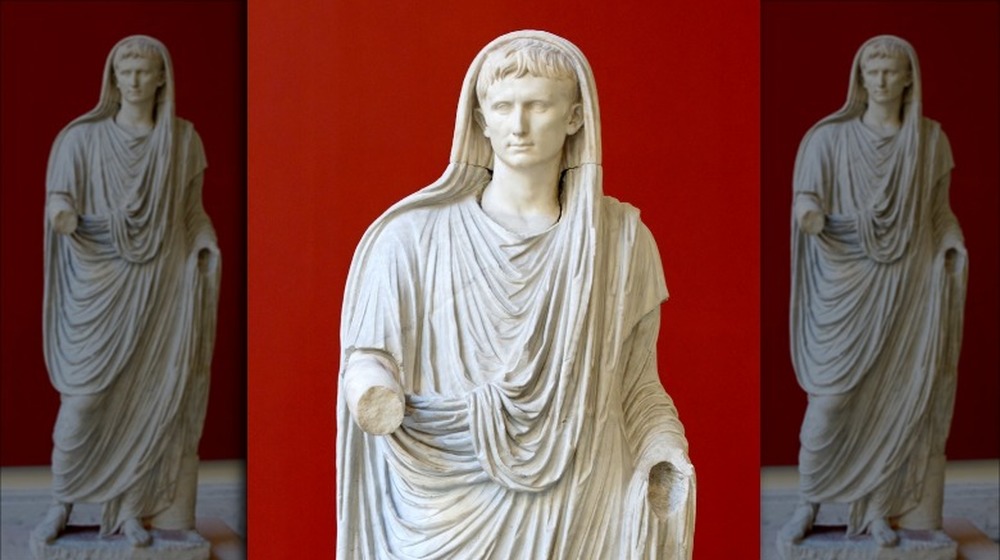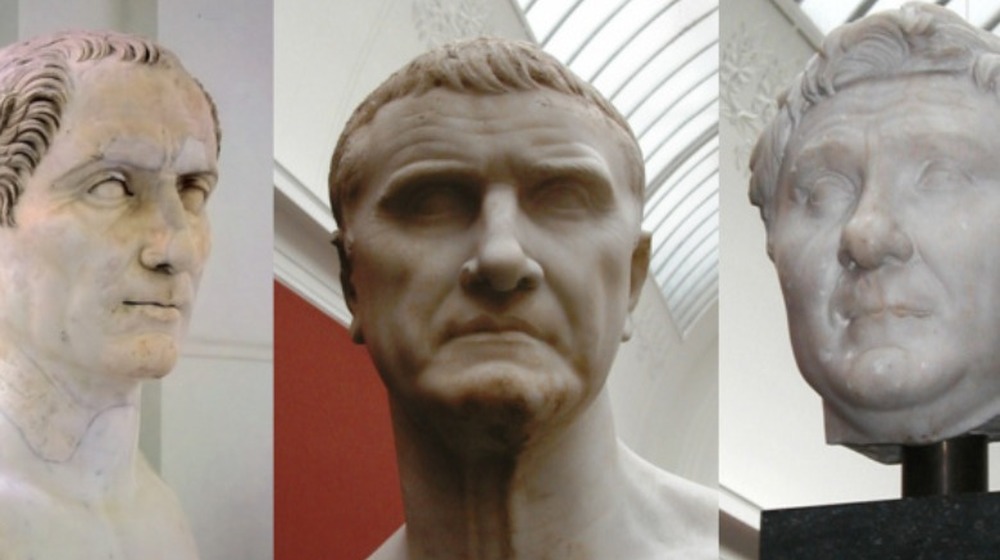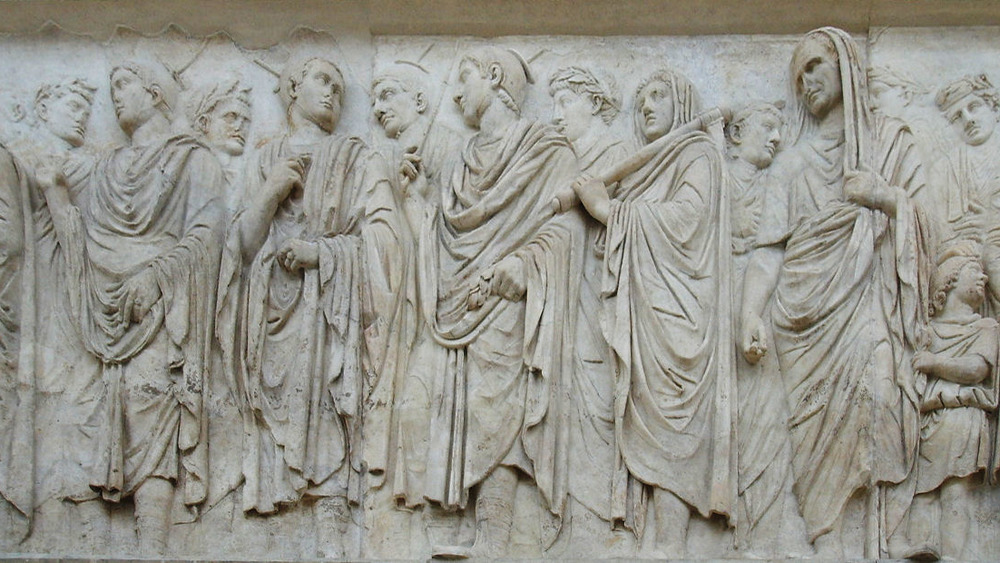Inside Julius Caesar's Connection To Priesthood
Gaius Julius Caesar is without a doubt the most famous Roman who ever lived, but he tends to be more famous for some things than others. Most know of his military conquests–reflected in his oft-quoted quip, Veni, vidi, vici, "I came, I saw, I conquered"–or the civil war he fought against his former ally Pompey–remembered in the modern phrases "crossing the Rubicon" and "the die has been cast." And thanks to Shakespeare, most English-speaking high schoolers know about his disastrous affair with Cleopatra or the dirty deed done to him on the Ides of March. So while people might think of Caesar as a general, a conqueror, a politician, or a dictator, there's one job that they might not associate with him: priest. Nonetheless, it was a title that Caesar held multiple times. In fact, Caesar's history with the priesthood goes back all the way to the earliest part of his career.
As the Ancient History Encyclopedia explains, Caesar's father died when he was only 16-years-old, making him the new head of household. Caesar felt that the best way to support his family was by joining the priesthood. An important piece of context here is that at this time, Rome was in the midst of a civil war between the aristocratic leader Lucius Sulla and the head of the populist faction Gaius Marius, who also happened to be Julius Caesar's uncle.
The strange restrictions of Julius Caesar's priesthood
Marius and his ally Cinna were the consuls of Rome (kind of like co-presidents) at the time that Caesar was seeking the priesthood, so naturally he was a shoo-in for the position. Caesar was appointed to the position of flamen dialis, or High Priest of Jupiter. As Smith's Dictionary of Greek and Roman Antiquities explains, a flamen is a priest dedicated to the worship of one specific god, and the dialis was the priest dedicated to the king of the gods, Jupiter. As you might expect, there were a number of restrictions and taboos placed upon the role of being the servant of the god known as The Greatest and Best, but you might not expect how specific they were: the flamen dialis was not allowed to be outside of the city for even one night, nor could he touch a horse, or look at an army, or hold civil office, or touch metal, or wear a ring, or touch a dog, or eat bread with yeast, or get his hair or fingernails cut by a slave, among many other restrictions.
Another notable rule was that the flamen had to be of the patrician class (which, despite his political support of the lower classes, Caesar was) and had to be married to a woman of patrician stock. This was an issue for Caesar, who was engaged to a plebeian girl. Nonetheless, for political expediency, Caesar broke off this engagement and married the daughter of his uncle's ally Cinna, further strengthening his bond with the populist movement.
Julius Caesar's removal from the priesthood allowed his rise to power
However, shortly after this, Lucius Sulla, the great enemy of Caesar's family, declared himself dictator and instituted death purges of his political enemies. Prior to this, Caesar's youth had exempted him from Sulla's ire, but now as the married head of his family, he was a target, especially due to his marital connections to the previous regime. Caesar and his wife were forced to go into hiding, but fortunately the proscription order against him was lifted thanks to the intercession of his mother's family, which included many supporters of Sulla and some Vestal Virgins. Nonetheless, this spelled the end of Caesar's career as the priest of Jupiter. In order to support his family, he was forced to join the army, and soon he would be breaking pretty much every taboo for the flamen dialis: looking at armies, touching horses, touching metal, leaving Rome, and much more.
Some 20 years later, Sulla was dead, and Caesar had established himself as an effective and successful military leader. The Ancient History Encyclopedia explains that at this time, Caesar decided to return to Rome to try to make it there. First, his deft hand at public speaking helped make him a successful lawyer, and after a little bit of being kidnapped by pirates, he was elected to the office of military tribune. At this time, the powerful political alliance known as the First Triumvirate was formed between Caesar, the general who would be known as Pompey the Great, and Marcus Crassus, the richest man in Rome.
Julius Caesar takes on the priesthood a second time
With the support of these two men, specifically the funding by Marcus Crassus, Julius Caesar was able to be elected to the position of pontifex maximus in 63 BCE. The pontifex maximus was the chief priest of the Roman state religion, the most important role in the Roman religion, even though it was officially a lower rank than his previous priesthood as flamen dialis. The primary role of the pontifex was the collection of signs and omens that were interpreted in an attempt to understand the will of the gods. Interestingly, this title of the high Roman priest was carried over even after Christianity took over the Roman Empire, and the official title of the Pope to this day is the pontifex maximus, or supreme pontiff.
The role of pontifex was not considered a civil magistracy the way that other offices like praetor were, and so Julius Caesar was able to maintain the position of high priest even as he ascended the ranks of political power, led the conquest of Gaul, and fought a civil war against Pompey. He was still the main dude of Roman religion at the time of his assassination in 44 BCE.



